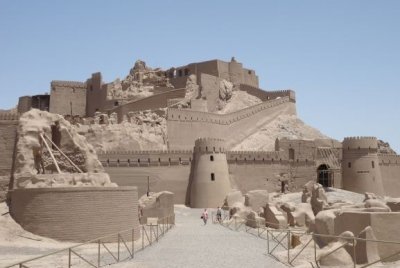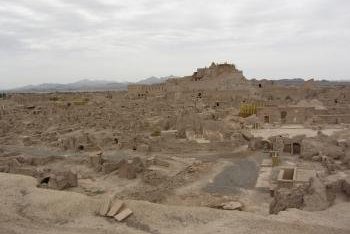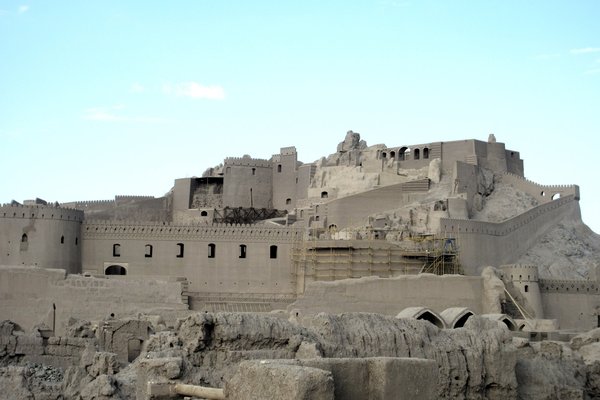Iran
Bam Cultural Landscape
Bam and its Cultural Landscape is an outstanding example of a medieval Central Asian trading settlement in a desert environment.
The site consists of a fortified mud-brick citadel (Arg-e Bam) with part of the old town within its walls, and the surrounding countryside, including other settlements and medieval structures such as mausolea. An elaborate underground water management system (the qanâts) is still in use today, together with its supporting social system.
Community Perspective: "In its current state, it really is not particularly exciting" - traces of the 2003 earthquake were still everywhere when our two reviewers, Jarek (2010) and Alexander (2016), visited. Many parts were closed for visiting or looked after by indifferent guards.
Site Info
Official Information
- Full Name
- Bam and its Cultural Landscape (ID: 1208)
- Country
- Iran
- Status
-
Inscribed 2004
Site history
History of Bam Cultural Landscape
- 2013: Removed from Danger list
- 2004: In Danger
- earthquake
- 2004: Inscribed
- Inscribed
- Type
- Cultural
- Criteria
- ii
- iii
- iv
- v
Links
- UNESCO
- whc.unesco.org
- Official
-
- visitiran.ir — Visit Iran
- Related
-
- iranicaonline.org — Encyclopaedia Iranica: Bam Earthquake 2003
- smh.com.au — Lost beauty that was Bam
- sacredsites.com — Link
All Links
UNESCO.org
- whc.unesco.org — whc.unesco.org/
Official Website
- visitiran.ir — Visit Iran
Related Resources
- iranicaonline.org — Encyclopaedia Iranica: Bam Earthquake 2003
- smh.com.au — Lost beauty that was Bam
- sacredsites.com — Link
News Article
- Aug. 16, 2017 financialtribune.com — Bam Citadel Restoration in 2 Years
- May 25, 2016 en.mehrnews.com — Bam Citadel to open to public after 13 years
- Dec. 28, 2013 japantimes.co.jp — Iran rebuilding famed Bam citadel
- Oct. 27, 2011 tehrantimes.com — UNESCO concerned over shantytown near Bam
- Jan. 18, 2009 presstv.ir — Iran to reopen restored Bam barracks in February 2009
- Sept. 10, 2008 tehrantimes.com — Italy and Iran have recently signed an agreement for buttressing, preservation, and restoration of the Bam Citadel
Community Information
- Community Category
- Cultural Landscape: Continuing
Travel Information
Exact locations inscribed twice (or more)
Red Zone Travel Advisory
Iran fully off-limits
Recent Connections
-
Location for a classic movie
The Desert of the Tartars (1976, it won… -
Red Zone Travel Advisory
Iran fully off-limits
-
Foreigner prices
1,000,000 Rial for foreigners, locals u…
Connections of Bam Cultural Landscape
- History
-
-
Achaemenid Empire
The origins of Bam can be traced back to the Achaemenid period -
Parthian Empire
Earliest remains (citadel of Arg-? Bam) probably belong to the Parthian dynasty -
Silk Roads
Classic Land Route; "For centuries, Bam had a strategic location on the Silk Roads connecting it to Central Asia in the east, the Persian Gulf in the south, as well as Egypt in the west and it is an example of the interaction of the various influences" (AB ev)
-
- Architecture
-
-
Vernacular architecture
the most representative example of a fortified medieval town built in vernacular technique using mud layers (AB ev)
-
- Damaged
-
-
Destroyed or damaged by Earthquake
(Dec 26 2003)
-
- World Heritage Process
-
-
Exact locations inscribed twice (or more)
The Bam CL includes parts of the Akbar Abad and Ghasam Abad Qanats which are inscribed as part of the Persian Qanats -
Former In Danger List sites
2004-2013 -
Perfect Inscriptions
2004 -
Directly in Danger
Emergency Inscription, after Earthquake Dec 26 2003
-
- Religion and Belief
-
-
Notable mosques
The Bam citadel has two mosques, one is the Jame' Mosque and the other the Hazrat Mohammad (AS) Mosque.
-
- Human Activity
-
-
Irrigation and drainage
the qanats
-
- Constructions
-
-
Icehouses
Outside the fortified enclosure, north-east of the Citadel, there is a large Icehouse (Yakhchāl). (AB ev)
-
- WHS on Other Lists
-
-
Global Heritage Fund
Threat level: rescue needed -
World Monuments Watch (past)
(2006)
-
- Timeline
-
-
Built in the 7th century
Its heyday was from the 7th to 11th centuries (AB ev)
-
- WHS Hotspots
- Visiting conditions
-
-
Foreigner prices
1,000,000 Rial for foreigners, locals unknown -
Red Zone Travel Advisory
Iran fully off-limits
-
- Literature & Film
-
-
Location for a classic movie
The Desert of the Tartars (1976, it won the Italian film prize David di Donatello and was one of the selected Classics at the Cannes film festival)See en.wikipedia.org
-
News
- financialtribune.com 08/16/2017
- Bam Citadel Restoration in 2 Years
- en.mehrnews.com 05/25/2016
- Bam Citadel to open to public afte…
- japantimes.co.jp 12/28/2013
- Iran rebuilding famed Bam citadel
Recent Visitors
Visitors of Bam Cultural Landscape
- Afshin Iranpour
- Alexander Parsons
- Ammon Watkins
- Artur Anuszewski
- Atila Ege
- Christian Wagner
- DouglasR
- Emili Xaus
- Erik Jelinek
- Ivan Rucek
- Jacob Otten
- Jarek Pokrzywnicki
- Javier
- Jean Lecaillon
- Knut
- Malgorzata Kopczynska
- Martina Rúčková
- MaYumin
- Morodhi
- Nihal Ege
- Roman Bruehwiler
- Solivagant
- Szucs Tamas
- Thomas Buechler
- Wieland
- Wojciech Fedoruk
- Zoë Sheng
Community Reviews
Show full reviews
Site visited in May, 2010. No doubt one of world wonders and certainly a must-see place while visiting Iran (together with many others). Once considered the biggest adobe (clay-based) building in the world, Arg-e Bam or Bam Citadel is currently slowly rising from ruins after devastating earthquake that struck in 2003 destroying the whole city.
Currently the traces of the earthquake are visible everywhere. Citadel is undergoing restoration process, still in scaffoldings, with many parts closed for visiting. Other are carefully restored and only on the tables with photos you can see the level of destruction (photos were taken shortly after the earthquake). Many parts of the lower city have already been restored like areas around bazaar, Tekiyeh (central square surrounded by chambers), stables or Garrison (barracs), other like Governor’s Residence (upper part on the hill) or areas around Jameh Mosque are still under reconstruction. In fact it is possible to visit the lower part of the city (as well as certain part of town walls) while the part still under reconstruction is closed for visiting (especially Governor’s Residence).
More about the earthquake and its consequences you can read here https://www.earth-auroville.com/bam_and_arg_e_bam_en.php
Entrance to site is currently paid (around 200 000 Iranian Rial). Unfortunately Iran still performs a policy of different (higher) fees for foreigners (not only in Bam but also in other major tourist attractions). But Bam Cultural Landscape includes not only Bam Citadel. In fact if you look at official UNESCO map (http://whc.unesco.org/en/list/1208/multiple=1&unique_number=1564), Arg-e Bam is …
Keep reading 0 comments
The curious thing with the Arg-e Bam is that I feel it was inscribed precisely in response to the loss of any potential Outstanding Universal Value it may have had. By all accounts it was very impressive prior to the 2003 earthquake which obliterated it and the surrounding town of Bam, but in its current state, it really is not particularly exciting. Actually, this assessment is probably too harsh, given many sites in worse states of repair are considered worthy; while the OUV may well still exist, its allure as a destination worth travelling to is now in question.
While the area around Bam is subject to various governmental travel warnings, it did not feel hugely different from elsewhere in Iran, apart from a police checkpoint along the highway. I visited with a taxi directly from Kerman, and thus avoided having to walk through the town of Bam itself, which admittedly did feel a bit more ‘frontier’ than elsewhere (this is probably simply because a lot of buildings aren’t quite rebuilt after the earthquake), but the site itself was perfectly fine. A guard noted my nationality in his notebook as I arrived, with the usual surprise at the response of ‘Australian’. Luckily this was not one of the multiple times this has been misheard as ‘Israeli’. The arg was filled with various Iranian tourists, including a school group, and the omnipresent phenomenon of the Italian tour group.
Disappointingly, the main citadel is unable to be climbed, with access prevented past …
Keep reading 0 comments
